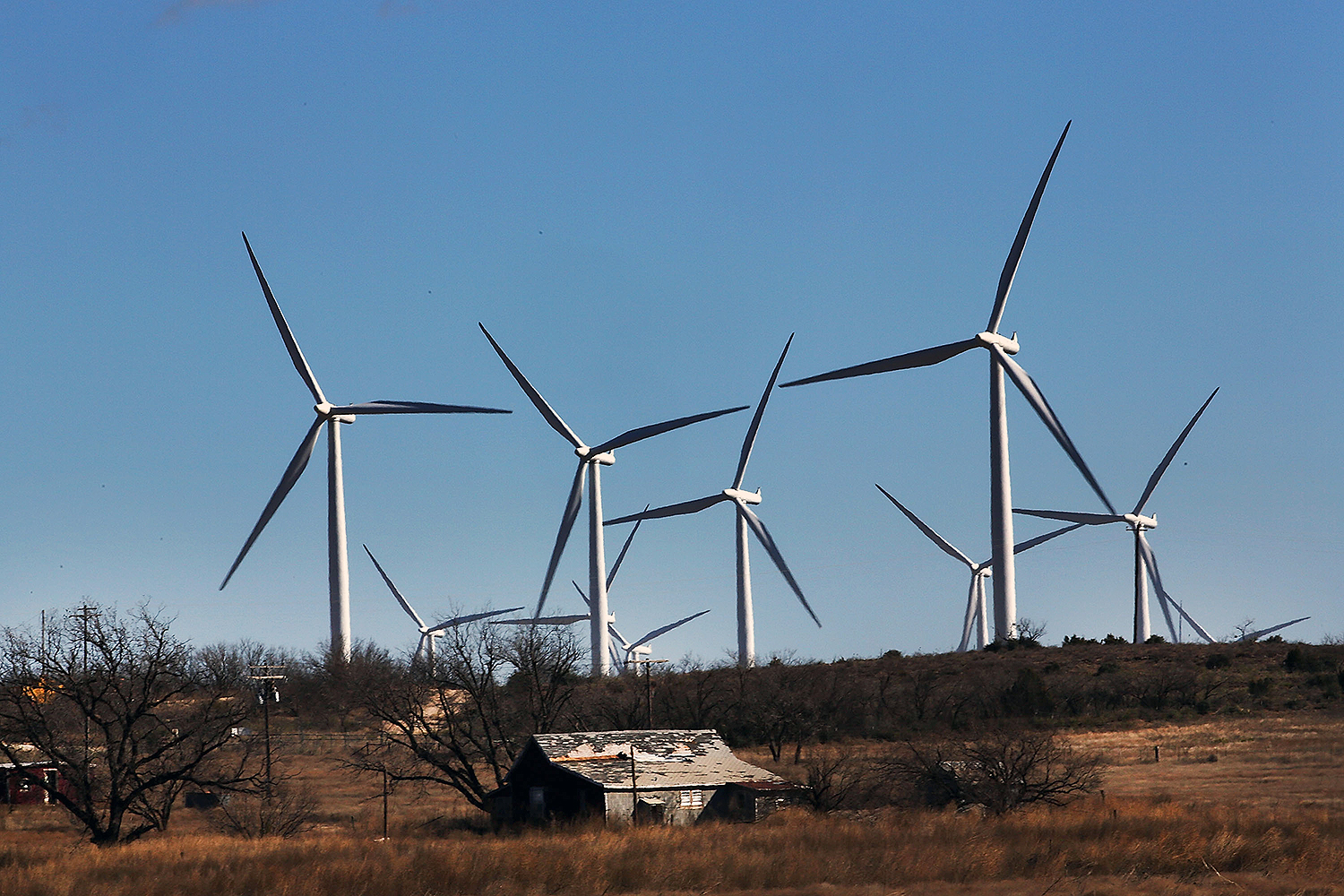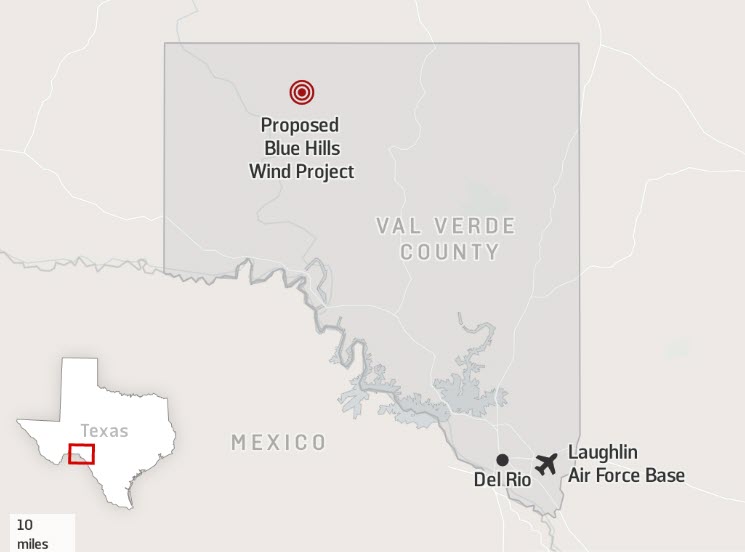Oil & Gas Publishers Note: Ok now you really have my attention: “You have to be kidding me”. Allowing a Chinese owned wind farm next to our air base in Texas? I may be calling Governor Abbot on this one.
The Trump administration will not block a Chinese-owned company from building a wind farm in Texas near the Air Force’s largest pilot training base, a person familiar with the decision told Foreign Policy, allowing a project to move forward that lawmakers fear could be used to spy on American troops, disrupt flight routes, and give Beijing a foothold in the U.S. electrical grid.
The decision comes after an analysis from the Committee on Foreign Investment in the United States (CFIUS), a panel of different federal agencies that examines the impact of foreign investments in the United States, found that the wind farm does not currently pose a national security concern. But GH America Energy, the U.S. unit of a Chinese firm, must still mitigate the impact of wind turbines that could interfere with low-level flight training routes at Laughlin Air Force Base. Those plans are currently under review in a separate process led by the Air Force and the Defense Department’s Military Aviation and Installation Assurance Siting Clearinghouse.

For years the Trump administration has been on a collision course with China over trade, geopolitics, and, now, the coronavirus pandemic. Amid a groundswell of anti-China sentiment in Washington, top administration officials have begun hammering other countries, including close allies, for allowing Chinese investment in their critical infrastructure and other industries relevant to national security.
Now, the prospect of turbines cropping up at the Blue Hills Wind development, just a few dozen miles from the U.S.-Mexico border and the limestone bedrock of the Edwards Plateau, has brought the U.S. competition with China to an unlikely place: the small town of Del Rio, Texas, home to Laughlin and a dryland paradise for nature lovers and hunters that boasts ancient rock art dating back before the days of the Egyptian pharaohs.

The project would put wind turbines at the Blue Hills Wind development, just a few dozen miles from the U.S.-Mexico border and near Laughlin Air Force Base.
The developer, GH America Energy, a subsidiary of Guanghui Energy Company, a firm owned by a former Chinese army officer and the richest person in China’s embattled Xinjiang province, declined requests to comment for this story. A Treasury Department spokeswoman declined to comment, citing policy preventing the agency from talking publicly about individual CFIUS cases.
Under CFIUS law, the United States can put the project under review at any time if there are new developments at the site, or if the Chinese-owned company does not notify it of changes. In the meantime, members of Congress and local officials fear the foreign company could interfere with the air base, sully the pristine wilderness, burrow into the electrical grid, or even use the project as a platform for Chinese government-directed espionage.
“Why this location and why this project?” Rep. Will Hurd, a Republican who represents a district that stretches westward across Texas from San Antonio toward El Paso and includes the project, told Foreign Policy. “Why are we allowing a Chinese company to do that in the U.S.? A former U.S. general would not be able to do this kind of project in China.”

That is a question that’s bedeviled military officials, local leaders, activists, and lawmakers who have tracked this case for two years. The problem of wind farms popping up near military flight routes isn’t new: Then-Lt. Gen. Steven Kwast had been dealing with the issue for more than a decade when in November 2017 he took over the Air Force’s San Antonio-based Education and Training Command, which oversees Laughlin. But while Kwast believed the military’s improving technology could prevent wind-powered turbines from messing with radar signals, when he learned that a Chinese company was buying up acreage near Laughlin Air Force Base just a year into his tenure, it alerted him to a potential national security risk.
[contextly_sidebar id=”sM5DgieOcdbEOUjtQ5WTG4OScMy8cKJm”]
“It triggered alarms the first time that we got evidence of Chinese money,” said Kwast, who is now retired. “If the electricity stops or the water stops flowing, those bases stop operating.”
Even more puzzling, the business case for the new venture didn’t make much sense to Kwast and local officials. How would the property—which lawmakers and county advocates say is in the middle of nowhere and did not have significant road access at the time—be able to turn a profit?
The Del Rio community also began to get worried. Local leaders were intent on salvaging Air Force training routes that could be jeopardized by the construction of large wind turbines. Laughlin graduates more than 350 student pilots each year, according to a 2018 release, and its flight routes are critical to the area’s economy. The base contributed $2 billion to the state’s economy last year, and it indirectly or directly provides more than 10,000 jobs, estimates from the Texas comptroller’s office show.
But the forces that let Guanghui buy up the acreage near Laughlin and Del Rio have been brewing for more than two decades. Project developers love the lack of red tape; foreign buyers have come to love the Texas’s deregulatory swagger and loose rules on property purchases. (The state’s land is about 95 percent privately owned.) The federal government has some legal authorities in place to review and block foreign investments over national security concerns, such as the CFIUS process.
In Texas, however, there’s a high bar for authorities to step in and stop development on wind farms. Ever since the Texas legislature put in place a 1999 mandate calling on the state’s utilities to get more power from renewable sources, it’s been hard to stop these ventures from going forward.
“On the state and federal level there are no regulations regarding the development of these wind farms,” said Jack Hession, a senior vice president at Madison Government Affairs, a Washington lobbying shop that is representing the Del Rio community, told Foreign Policy. “There’s no way to deny it as it was purchased. The proposal to do a wind farm was a viable option for the owner.”
The issue first came to the attention of local officials in early 2018, after Guanghui purchased properties including nine ranches under the name of Brazos Highland Properties LP, environmentalists say, a holding company controlled by the firm. The company proposed building 50 to 130 wind turbines that could reach up to 700 feet above ground level, according to estimates that local officials provided to the Trump administration.
Beyond the geopolitics and national security concerns, the project has also riled up local environmentalists who worry that the wind farm could despoil prime clear waters cherished by boaters, nature lovers, and hunters from across the state.
“Hunters from Houston, Dallas, they don’t want to be looking at tall turbines and watching red lights blinking on the horizon all night,” said Randy Nunns, a landowner and the president of the board of the Devils River Conservancy, a local environmental advocacy group that has opposed the wind farm.
For now, Guanghui appears to have assuaged—just barely—concerns that were its biggest potential hurdle other than CFIUS, the Air Force’s requirement to clear turbines from the proposed low-level training route, Hession said, though he cautioned there is no deal or agreement in place. An Air Force spokesperson told Foreign Policy that an agreement has not been finalized but is currently under review by both the service and the Pentagon’s Military Aviation and Installation Assurance Siting Clearinghouse.
That hasn’t fully satisfied local officials or Congress, though, who fear that the worst is yet to come as Guanghui eyes further development of wind and solar projects in the area that could encroach upon flight routes.
Letters obtained by Foreign Policy show that by February, a Val Verde County judge and Del Rio’s mayor had told Treasury Secretary Steven Mnuchin, Secretary of State Mike Pompeo, and Secretary of the Air Force Barbara Barrett that the project posed long-term challenges to flight training operations at Laughlin.
“Our greatest concern is the long-term implications this will have on the Air Force’s mission of pilot training not with a single application, but rather a cumulative strategy that cannot be evaluated in the first filing,” County Judge Lewis G. Owens Jr. and Del Rio Mayor Bruno Lozano wrote to Mnuchin in February. “We believe that this project and all future projects of a similar nature will result in unacceptable risk to national security of the United States.”
Lawmakers who might normally welcome foreign investment with open arms are also looking askance at the project. Leading the charge has been Sen. Ted Cruz, a Texas Republican, who traveled to Laughlin Air Force Base in February and raised concerns that the project poses a potential threat of Chinese espionage.
“Sen. Cruz is particularly concerned by the threat of a Chinese-owned company erecting wind farms near Laughlin. China has demonstrated a willingness to invest billions of dollars in specific, targeted economic initiatives through private companies to expand the global reach of their security and espionage capabilities,” a spokesperson for Cruz told Foreign Policy. “Not only will these wind farms near Laughlin affect training routes, they could also risk our national security.”



